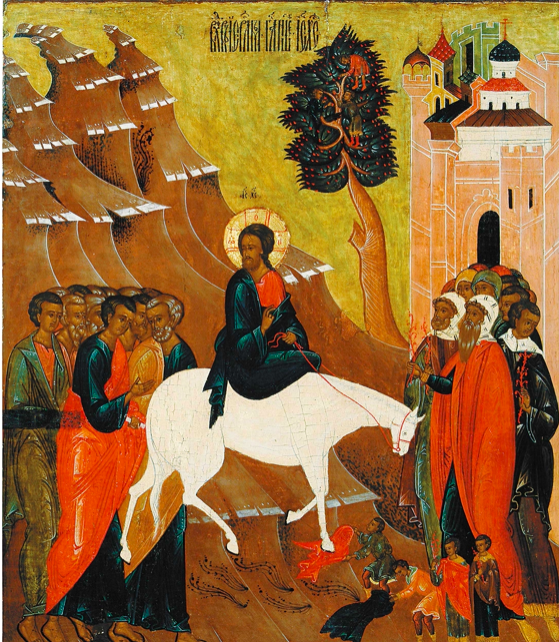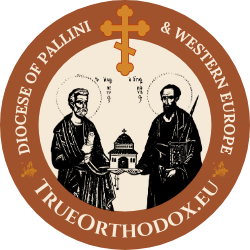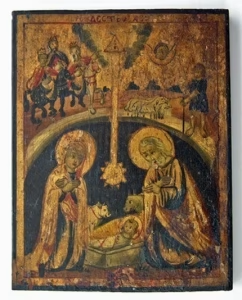SERMON ON THE LORD’S ENTRANCE TO JERUSALEM BY HIS EMINENCE ARCHBISHOP TIKHON FIRST HIERARCH OF THE RUSSIAN TRUE ORTHODOX CHURCH – Unofficial Translation

2021, Kogalym
Then Jesus six days before the passover came to Bethany, where Lazarus was, which had been dead, whom He raised from the dead. There they made Him a supper; and Martha served: but Lazarus was one of them that sat at the table with Him. Then took Mary a pound of ointment of spikenard, very costly, and anointed the feet of Jesus, and wiped His feet with her hair: and the house was filled with the odour of the ointment. Then saith one of His disciples, Judas Iscariot, Simon’s son, which should betray Him, Why was not this ointment sold for three hundred pence, and given to the poor? This he said, not that he cared for the poor; but because he was a thief, and had the bag, and bare what was put therein. Then said Jesus, Let her alone: against the day of My burying hath she kept this. For the poor always ye have with you; but Me ye have not always. Much people of the Jews therefore knew that He was there: and they came not for Jesus’ sake only, but that they might see Lazarus also, whom He had raised from the dead. But the chief priests consulted that they might put Lazarus also to death; Because that by reason of him many of the Jews went away, and believed on Jesus.
On the next day much people that were come to the feast, when they heard that Jesus was coming to Jerusalem, Took branches of palm trees, and went forth to meet Him, and cried, Hosanna: Blessed is the King of Israel that cometh in the name of the Lord. And Jesus, when He had found a young ass, sat thereon; as it is written, Fear not, daughter of Sion: behold, thy King cometh, sitting on an ass’s colt. These things understood not His disciples at the first: but when Jesus was glorified, then remembered they that these things were written of Him, and that they had done these things unto Him. The people therefore that was with Him when he called Lazarus out of his grave, and raised him from the dead, bare record. For this cause the people also met him, for that they heard that He had done this miracle. (St. John 12:1-18)
In the name of the Father and of the Son and of the Holy Spirit.
The days of the world-saving sufferings of our Lord Jesus Christ, which He foretold to His disciples, the future Apostles, are drawing near. Today, together with our Church, we prayerfully and solemnly remember the entrance of the King of Glory, Christ the Savior, into the holy city of Jerusalem, which could be called the royal city, the capital city of the King of Glory.
It should be noted that the divine characteristic of the Lord Jesus Christ is that wherever He, the Son of God, appeared, there was a division of people – people were divided, standing on His right side and on the left, as they will be divided at His second and glorious coming on the last day of the world. And today’s Gospel describes this division of people – on one side were the people who greeted the Lord triumphantly as he entered Jerusalem, and on the other side were the Pharisees who conspired to kill not only Christ, but also his friend Lazarus.
This event, which was read about in the Gospel, took place before the Jewish Passover, and therefore Jerusalem was in a state of great commotion, as millions of Jews from all over the world flocked there. And when the city was filled with people, there was a grand and regal reception of the long-awaited Messiah, the Savior of the world. It is clear from the Gospel that the news of the miracle of the raising of Lazarus, wrought by Jesus Christ, travelled ahead of the Savior Himself with lightning speed. This news of the astounding miracle lifted the moods and spirits of all who revered and loved Jesus Christ. At first, the Apostles waited and were assured that their Master would come to Jerusalem and be glorified as an earthly king. They believed that He was coming in to take the throne and become king. Therefore, they also shouted together with all of them: “Hosanna, blessed is He that cometh in the name of the Lord!” The enthusiasm of the people was so great that they spread their clothes on the path along which the Savior rode, cut off the branches of date palms and other trees, covered His path with them, and held them in their hands as a sign of triumph and celebration.
But the One responsible for the celebration – the Lord Jesus Christ – did not take part in this rejoicing, on the contrary, as it is said in the Gospel of St. Luke about this event, when they approached Jerusalem, and the view of the beauty of the holy city opened, Jesus Christ, despite the rejoicing of the people around Him, as if not seeing or hearing this rejoicing, wept, looking at the city and said: “If thou knewest, even thou, and at least in this thy day, the things for thy peace! But now it is hidden from thine eyes. For the days shall come upon thee that thine enemies shall put a rampart around thee, and encompass thee and contain thee on every side, and dash to the ground thee and thy children within thee; and they shall not leave in thee a stone upon a stone, because thou knewest not the time of thy visitation” (St. Luke 19:42-44). And indeed, with the rejection of the Messiah the fate of the nation of Israel was sealed forever.
The entry of the Lord into Jerusalem confounded the enemies of Jesus even more than the resurrection of Lazarus. The One who was secretly condemned to death by the supreme Sanhedrin, whose whereabouts were to be reported to the authorities by everyone, under the fear of severe punishment – the same One, in the face of the Sanhedrin, triumphantly entered Jerusalem, spent half a day in the Temple, accepted the honors belonging to the Messiah and retired to solitude as a conqueror. This incident showed the significance of moral strength and meekness, and how much they can do against deceit and malice. The Son of David did not have a single minister to stand up for Him. The legions of Angels, always ready to come to the aid of the Son of God, were only silent spectators of this procession. He had only truth and righteousness on His side – and the whole Sanhedrin could do nothing against Him, thus recognizing itself as defeated.
But the Lord knew how fickle a people are, and how fickle a crowd. In His divine omniscience, He foresaw that within a week the cries of “Hosanna, to the Son of David” (St. Matthew 21:9) would be replaced by cries of “Take Him away, take Him away, crucify Him” (St. John 19:15), and that these terrible words, though not without the influence of the Pharisees and elders, would be cried by the very people who were now welcoming Him triumphantly. This filled His soul with deep sorrow. But there was also one consolation in this public exaltation, which pleased the Saviour at His entrance to the Temple in Jerusalem – these were the pure children’s voices, which exclaimed to Him from pure children’s hearts: “Hosanna, to the Son of David!” This is what the Lord rejoiced over, and the children also rejoiced and triumphed in a childlike way, even though they did not understand all that was happening, but directly expressed their delight and love to the Lord. But to the chief priests and scribes, the exclamations in honor of the God-Man from the children seemed a pitiful triumph, which was only appropriate for such a person who, in the Saviour’s own words, had no place to lay his head. The Pharisees were indignantly sarcastic: “Hearest Thou what these say,” what honor Thou art being given? – referring to the children. And then the Lord answered them: “Did ye never read, ‘Out of the mouth of babes and sucklings Thou hast perfected praise for Thyself’?” (St. Matthew 21:16). As we can see, the sword of the word of God also struck the haughty Pharisees this time.
And today we also prayerfully remember this event – the entry of our Lord Jesus Christ into Jerusalem, and celebrate it by holding the branches of trees in our hands, but we must also remember that this day, according to the Church prayer, is not only a feast, but also a forefeast. For if today’s Sunday is called “Palm Sunday” or “The Entrance of the Lord into Jerusalem,” then the next Sunday will be a “Feast of Feasts” – the Holy Passover of the Lord, which, may God grant, we all live to see, and by the grace of God – to meet It even more triumphantly and joyfully.
But between these two great feasts, these two Sundays, is Holy Week, which carries all the richness of memories of the world-saving sufferings of Jesus Christ, which are reflected in all the divine services, prayers and sacred rites of Holy Week. Let us try, brothers and sisters, to draw as much as possible from this wealth, because this is a particularly blessed and sacred time in the entire Church-Liturgical year.
At the time of Jesus Christ’s entry into Jerusalem, the Jewish people cried out: “blessed is He Who cometh in the name of the Lord” (St. Matthew 21:9), thinking that Christ, taking the throne of David, would deliver them from Roman rule. But you and I, repeating these words, know that Christ is going to Jerusalem to suffer, to deliver us from the dominion of the devil, sin, damnation, and death. Let us not leave Him, brothers and sisters, alone in the midst of approaching suffering. Let us remember that the whole life of the Head of our salvation was a single Cross, which is made up of an innumerable number of crosses of all people, just as the sea is made up of drops. And no one touched His burden, except to make it heavier. Let us try, to the best of our feeble strength, to sympathize with Him, to detach ourselves, at least for a short time during the Holy Week, from our worldly carelessness and vanity, and to reflect on His sufferings, which were accepted for us.
So, the Lord is coming to His voluntary Passion for the sake of our salvation — remember us, O Lord, when Thou comest, in They kingdom.
AMEN.






